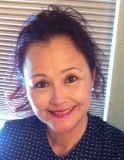
Clinical Health Coach Profile
Mari Tamanaha – Ochsner
RN Health Coach
|
Interviewer: |
Tell me about your role in your clinic or hospital? |
|
Mari: |
I’m in a clinic and I was hired about 2 years ago for Ochsner. I worked in a family practice clinic and 2 ½ years ago was hired as an RN health coach. I had no training or background, although I had been an RN for 32 years. My co-workers all attended the Iowa onsite session. I got some immediate tips from my co-workers on health coaching and how to take care of the patients’ needs here in the clinic. I have to say that the best thing that happened was that Clinical Health Coach® put the training online. The problem was that with scheduling and the immediacy of the clinics’ needs, I never had the opportunity to go to an onsite session. As soon as the online training became available, I was like “Yeah”! |
|
Interviewer: |
What do you see as your role in implementing clinical health coaching in your clinic? |
|
Mari: |
We are a PCMH certified clinic. We have two health coaches. We have anywhere from 12-14 providers with just two health coaches, which is pretty tough. As part of the PCMH, we also have the endocrinology department here and a diabetic educator. That is a great help and they both use motivational interviewing to get their patients toward self-care. |
|
Interviewer: |
Have your physicians been on board with clinical health coaching? |
|
Mari: |
Absolutely! We get immediate referrals. The patients may come in to see the physician and the physician may come back and say to me, “Can you please talk to this patient? We have been trying medication management, and this and that, but nothing seems to be helping, so can you please go in and talk to them?” |
|
Interviewer: |
That’s great that you have their support. |
|
Mari: |
It’s been great having PCMH here. |
|
Interviewer: |
Using your clinical health coaching skills, how have you been able to change patient behaviors, build their self-care skills, and help them take more accountability for their health care? |
|
Mari: |
The greatest impact I have seen has been in their behavior changes and accountability. You start pulling out of them what is important to them and get them to think about how their life might be different by making changes toward better health. I find it’s been really rewarding when they say to themselves they know what they need to do, and may even say, “Ya know, I’ll start this week, I really need to make a change.” It was very rewarding when the doctor came to me and said, “Remember “patient so-and-so”? Give me a high five! Their hemoglobin A1C was 8.9 when you first started to talk with them and now it’s down to a 6.8!” |
|
Interviewer: |
That’s got to make you feel great! |
|
Mari: |
It does… but then I remind him that it’s a team effort. We have a diabetic registry. We can run numbers and see the percentage of patients that are improving and it has definitely made a difference. |
|
Interviewer: |
What did you find to be your greatest challenge and what did you do to overcome it? |
|
Mari: |
Our biggest challenge would have to be time constraints. It’s been a challenge to try and get as much accomplished as you can in the short time you have with a patient. |
|
Interviewer: |
What advice would you have for someone just beginning this journey as a health coach in the clinical setting? |
|
Mari: |
Practice, practice, practice and find your own “personal groove” in the conversation flow. I had several co-workers who went through the onsite training and I was able to buddy coach with them so that was great! |
|
Interviewer: |
What was the most valuable lesson or skills that you took away from the Clinical Health Coach training? |
|
Mari: |
We all have the ability to listen as nurses or health care providers. It’s important to listen to what the patient says. I learned to listen with intent and not just with existence of being there. You have to really hear what the patient is saying, paying attention to non-verbal cues and recognize there may be much more to a patients’ story. It’s not just A, B or C and you’re done. Every patient is different. I’ve been a nurse for 32 years and sometimes we are so rushed getting our “tasks completed”. Clinical health coaching slows the pace which allows the patient to really think about things. |